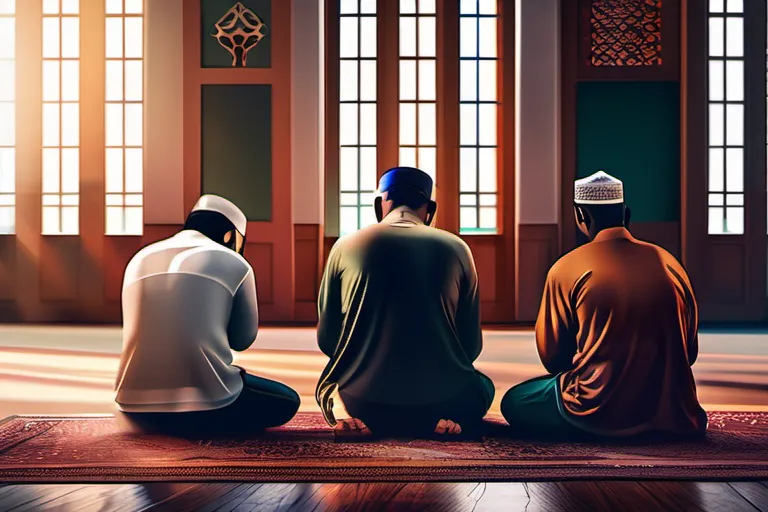Exploring the factors that influence the level of religious observance among Muslims
Muslims, like any other religious group, are not a monolith. Some adhere strictly to Islamic law (Shariah), while others may follow more lenient interpretations. This article delves into the reasons behind this variation in religious practice among Muslims.
The Role of Culture and Tradition
Why do some Muslims live by stricter rules than others? It’s like asking why a rose grows taller and more fragrant in one garden but not as robust in another. The answer often lies in the rich tapestry of culture and tradition that shapes their lives.
Culture acts much like the soil in which religious practices are rooted. In some regions, traditional values are deeply embedded, fostering an environment where strict adherence to Islamic teachings is the norm. Think of it as a fertile ground where customs, language, and historical context all contribute to a vibrant cultural identity that encourages rigorous observance.
For instance, in countries with a long-standing tradition of Islam, like Saudi Arabia or Egypt, the influence of local culture can be seen in daily life. The call to prayer echoes through the streets at precise times, and modesty is not just a religious duty but a cultural expectation. It’s as if the very air they breathe carries these practices, making them second nature.
On the other hand, in more diverse or secular societies, Islamic practices may be less rigidly defined by local traditions. Here, people might find themselves navigating between their personal faith and the broader societal norms. The rules can feel more like choices rather than mandates, much like choosing how deep to plant a flower in your garden.
Consider also the impact of family and community. In some communities, the weight of communal expectations can be heavy, pushing individuals towards stricter observance. It’s as if they’re walking in step with those who came before them, carrying on traditions that have been passed down through generations.
Yet, just like how different gardens thrive under varying conditions, each individual Muslim has their unique path. Some may find the strict rules comforting and guiding, while others might seek a balance between religious practice and modern living. It’s all about finding one’s own way in this vast garden of Islam.
In summary, the role of culture and tradition in shaping religious observance is like the subtle forces that shape a landscape over time. These factors mold not just how Muslims pray or fast but also influence their overall approach to faith and daily life. As we explore further into the geographical aspects affecting religious practice, remember that each region, like every flower, has its own unique story to tell.
The Impact of Geography
The Impact of Geography: Investigating How Proximity to Mecca and Living in Predominantly Muslim Countries Can Shape Religious Practice
Have you ever wondered why some Muslims adhere to stricter rules than others? One significant factor that often influences religious observance is geography. Imagine the world as a vast garden, with Mecca as its heart. Just like flowers need water and sunlight to bloom, Muslims who live closer to Mecca are akin to those flowers receiving more nourishment.
Consider Saudi Arabia, where the holy city of Mecca is located. The proximity to this sacred place often means that Muslims there have a deeper connection with their faith. Their daily lives reflect the importance of pilgrimage and prayer, making adherence to religious practices almost second nature. It’s as if they are always in the presence of the divine, constantly reminded of their duties.
In contrast, look at countries like Indonesia or Malaysia, where Islam is widely practiced but not the dominant religion. Here, Muslims live in a different environment, one that requires more effort to maintain strict religious practices. The absence of Mecca’s spiritual pull means they must actively seek out ways to stay connected, perhaps through more frequent visits to mosques or community gatherings.
But it’s not just about physical distance. The concept of ‘geographical’ piety can also be seen in diaspora communities where Muslims live far from their birthplace and home culture. These individuals often draw strength and inspiration from their roots, maintaining a strong sense of religious identity even as they adapt to new environments.
The impact of geography on religious practice is profound and multifaceted. It shapes not just the frequency of prayer but also the depth of one’s faith, creating a rich tapestry of observance patterns among Muslims worldwide. As we explore this landscape, it becomes clear that while religion provides a universal framework, its manifestation can be as varied as the geography it spans.
The Influence of Scholars and Leaders
Why do some Muslims live by stricter rules than others? It’s like asking why a gardener tends to their plants with such meticulous care, while another just sprinkles water occasionally. The answer lies in the guidance and interpretations offered by influential Islamic scholars and leaders, which shape the religious observance of their followers.
Consider the ummah, or Muslim community, as a vast garden, where each plant represents an individual’s level of adherence to religious practices. Just as some gardeners believe in following every rule down to the last detail—watering at precisely 6 AM, using specific soil types—the stricter practitioners are guided by scholars who emphasize rigorous adherence to Shariah.
Take the example of the Hanbali school of thought, which is known for its stringent interpretation of Islamic law. Scholars like Ibn Taymiyyah and his contemporary, Muhammad ibn Abdul Wahhab, have significantly influenced those who follow this path, urging them to adhere strictly to what they see as true Islam. These teachings can make a believer’s life resemble a tightly regulated garden where no stone is left unturned in following the rules.
On the other hand, there are Muslims who take a more flexible approach, guided by scholars from schools like Shafi’i or Maliki, which allow for interpretation and personal judgment in some areas of law. It’s as if these believers are gardeners who use a broader brush, ensuring that the plants thrive without being overly controlled.
So, why do some Muslims live by stricter rules than others? Because the guidance from respected scholars can set the tone. The metaphorical ‘garden’ of religious observance is cultivated differently depending on which teachings one follows, much like different gardeners might approach their craft with varying degrees of strictness and flexibility.
Understanding this dynamic helps us see why some communities or individuals appear more rigorous in their practices than others. It’s a matter of the scholarly guidance they follow, shaping their paths just as a gardener’s techniques shape a garden’s appearance.
The Role of Individual Beliefs
Why do some Muslims live by stricter rules than others? It’s a question that often leaves us pondering the depths of individual belief and practice in Islam. Have you ever wondered if it’s about personal choice, or is there something more profound at play?
Imagine a mosaic where each piece represents an individual Muslim, with their unique beliefs, experiences, and interpretations of Islam. Each piece fits together to form the broader picture, but no two pieces are exactly alike. This diversity in belief shapes how individuals approach their faith.
Consider the personal journey of a young woman who grew up in a traditional Muslim family. Her upbringing instilled a deep respect for Islamic teachings, leading her to adhere strictly to daily prayers and dietary laws. In contrast, another person from the same community might have found inspiration through Sufi poetry or modern Islamic thinkers, which led them to adopt a more liberal interpretation of their faith.
The path each individual takes can be influenced by numerous factors—personal experiences, family traditions, education, and spiritual mentors. These elements combine in a way that is as unique as the individual themselves. It’s like each person has their own map of Islamic practice, guided but not dictated by external sources.
Moreover, the level of religious observance can also be shaped by an individual’s sense of purpose and connection to their faith. Some may find a deep spiritual fulfillment in following more stringent rules, while others might feel that flexibility allows them to maintain a healthy balance between their religious obligations and modern life.
So, why do some Muslims live by stricter rules than others? It’s not just about the rules; it’s about the individual soul searching for meaning and purpose in their faith. The journey of each believer is unique, reflecting a personal interpretation that aligns with their own values and experiences.
This chapter has highlighted how personal beliefs, experiences, and interpretations shape an individual’s level of religious observance. In the next part, we will explore how modernization and globalization have impacted this landscape, leading to both increased strictness and leniency in some communities.
The Effects of Modernization and Globalization
Why do some Muslims live by stricter rules than others? As we explore this question, it’s essential to understand how modernization and globalization have intertwined to shape different approaches to practicing Islam.
Is it merely a matter of geography or culture that divides these communities into those who adhere strictly to their faith and those who practice more leniently?
Consider the bustling cities where skyscrapers touch the sky, and the humdrum of daily life is filled with the constant rhythm of technology. In such environments, people are often bombarded by a plethora of information and influences. This rapid pace can sometimes lead to a more structured lifestyle as individuals seek stability and certainty in their personal lives—a reflection perhaps of the broader societal shifts towards order and predictability.
Does this mean that stricter adherence to religious rules is simply a response to the chaos of modern life, a way to find grounding amidst the whirlwind?
Or could it be that in more traditional societies, where change comes at a slower pace and community bonds are stronger, individuals might feel less need for strict observance, relying instead on long-standing customs and practices passed down through generations?
Globalization, with its vast interconnectedness, has also played a significant role. As Muslims from diverse backgrounds come into contact with one another, they bring their unique cultural practices and interpretations of Islam. This exchange can either foster mutual understanding or lead to tension as different perspectives clash.
The question then arises: Can these differences in religious observance be seen as natural expressions of the human experience, reflecting the various contexts in which people live?
Understanding the Diversity within Islam
Why do some Muslims live by stricter rules than others? It’s like asking why two siblings might choose different paths when they grow up, yet both come from the same family. The answer lies in a complex interplay of personal beliefs, community influences, and individual experiences.
‘Are we all following one path or are there as many paths as there are individuals?’
Firstly, consider the role of personal interpretation. Just like how different people read between the lines in a book, Muslims can interpret their faith differently based on scholarly traditions and personal understandings. Some may adhere strictly to what they believe is most authentic, while others might take a more lenient approach.
Then there’s the impact of community and social structures. Imagine a garden where some flowers are cultivated closer to the sun for full exposure, while others grow in shade, receiving less light but thriving nonetheless. In similar fashion, communities that thrive in environments with strong religious guidance might enforce stricter practices, whereas those in more secular settings might adopt a more relaxed approach.
Moreover, socioeconomic factors play a significant role. It’s akin to the difference between having a choice of a five-course meal or settling for whatever is available on a busy day. People living in wealthier environments where they can afford more time and resources for religious practices are likely to follow stricter rules compared to those with fewer resources.
Lastly, psychological and emotional factors cannot be ignored. Some individuals find comfort and security in strict adherence to their faith, while others might feel liberated by a less rigid practice that allows for more personal freedom within their beliefs.
The diversity within Islam is not just a spectrum but a rich tapestry of individual experiences and collective influences. It’s essential to understand this diversity to foster mutual respect and dialogue among Muslims worldwide. After all, every thread in the fabric plays a role in making it beautiful, no matter how distinct or subtle its color might be.
Conclusion
 Ultimately, the level of religious observance among Muslims is influenced by a complex interplay of factors such as culture, geography, and individual beliefs. It’s important to remember that there is no ‘one size fits all’ when it comes to Islam.
Ultimately, the level of religious observance among Muslims is influenced by a complex interplay of factors such as culture, geography, and individual beliefs. It’s important to remember that there is no ‘one size fits all’ when it comes to Islam.











